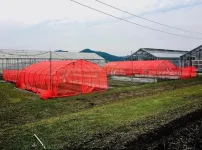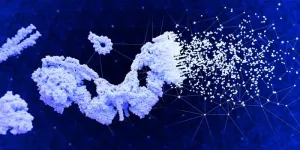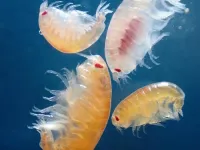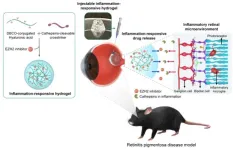(Press-News.org) USC, together with Leonard and his late wife Pamela Schaeffer, is launching a new institute with a $59 million gift from the Schaeffers to be anchored in Los Angeles and in the university’s new Capital Campus in Washington, D.C. The mission of the Leonard D. Schaeffer Institute for Public Policy & Government Service is to strengthen democracy by training generations of public leaders and advancing evidence-based research to shape policy that addresses the nation’s most pressing issues, USC President Carol Folt announced today.
Full story on USC Today
By combining and expanding two outstanding programs — the USC Schaeffer Center for Health Policy & Economics and the Leonard D. Schaeffer Fellows in Government Service — USC’s new institute will be able to significantly increase their scope, size and impact.
“The newly formed Schaeffer Institute accelerates USC’s capacity to develop effective academic leaders and to forge critical high-impact partnerships with influential policymakers and organizations,” Folt said.
“There are times in the life of a university when a vision and an opportunity align to become a powerful force to serve the public good.” Folt continued, “And our students and our nation need this now more than ever.”
The institute is the first major research and education facility to be headquartered at USC’s Capital Campus, which Folt opened in Dupont Circle last spring.
Schaeffer said the new institute has the potential to have a long-lasting impact at a time when the United States needs it most.
“Our country is experiencing a series of challenges that are unique in our history,” he said. “We are facing many difficult issues around the world — climate change, pandemics, violent conflicts in Europe and the Middle East, and world trade and economic problems, to name a few. Here at home, we are experiencing the loss of faith in science and government. The institute will have the faculty, students and postdocs to provide the analysis and facts necessary to counter erosion in public discourse and promote more effective policy solutions.”
The Institute in Washington, D.C.
The institute will create research programs built on the model developed by the Schaeffer Center in which scholars engage public- and private-sector leaders to advance policy solutions based on evidence-based research. The Schaeffer Center is ranked among the foremost organizations of its kind.
The gift will fund the build-out of the seventh floor of the Capital Campus, which will be dedicated to the Schaeffer Institute. The institute also will have offices on the USC University Park Campus.
Public policy training
The Schaeffers’ gift also will provide a permanent endowment for the Leonard D. Schaeffer Fellows in Government Service, the fellowship for undergraduate students to work in local, state and federal government offices.
The fellowships, which are administered by USC, are open to students across USC as well as those at four other participating universities: Harvard University; Princeton University; University of California, Berkeley; and the University of Virginia. The gift will allow at least 50 students from across the five universities to participate in the fellowship every year.
“The Schaeffer Institute will be an invaluable resource for education and scholarship, not just for Schaeffer scholars and its affiliated experts but for faculty members and students from across USC,” said Dana Goldman, dean of the USC Sol Price School and co-director of the USC Schaeffer Center. “Their ability to use our Capital Campus office to more easily engage with policymakers will give them far more impact.”
The Schaeffer Institute will be based in the Office of the Provost. Goldman will become the director of the Schaeffer Institute and will remain the co-director of the Schaeffer Center with Erin Trish, associate professor in the Department of Pharmaceutical and Health Economics at USC Mann School.
Goldman will step down as dean of USC Price School on July 1, 2024, when the institute is scheduled to open. An interim dean will lead the school while the university conducts a national search for a new dean for the USC Price School.
Erica Lovano McCann, who currently serves as USC’s assistant vice provost for undergraduate education, will become the full-time executive director of the expanded Schaeffer Fellows in Government Service program.
The Shaeffers’ legacy
The gift for the institute is the Schaeffers’ single largest to the university. The couple founded several chaired professorships, including the Leonard D. Schaeffer Fellows in Government Service. A gift in 2009 enabled the university to create the namesake USC Leonard D. Schaeffer Center for Health Policy & Economics.
Leonard Schaeffer is one of the most accomplished leaders in American health care, with a career that spans the private, public and philanthropic sectors. He was the founding chairman and CEO of WellPoint, the nation’s largest health benefits company by membership, as well as the administrator of the federal Health Care Financing Administration (now the Centers for Medicare & Medicaid Services).
He has served on the boards of numerous business, philanthropic and professional organizations. Schaeffer was awarded an honorary degree from USC and received the inaugural USC Sol Price Award for his lifetime achievements as a business leader, policy expert and philanthropist. He is a USC trustee and chair of the Schaeffer Center’s Board of Advisers. He also is a member of the USC Price School’s Board of Councilors.
Available for interviews:
USC President Carol Folt
Dana Goldman
###
END
USC announces new Leonard D. Schaeffer Institute for Public Policy & Government Service
Leonard and Pamela Schaeffer’s $59 million gift to establish a new institute will address multiple public policy issues with evidence-based research and train generations of new scholars
2024-02-14
ELSE PRESS RELEASES FROM THIS DATE:
Nearly 15% of Americans deny climate change is real, AI study finds
2024-02-14
ANN ARBOR—Using social media data and artificial intelligence in a comprehensive national assessment, a new University of Michigan study reveals that nearly 15% of Americans deny that climate change is real.
Scientists have long warned that a warming climate will cause communities around the globe to face increasing risks due to unprecedented levels of flooding, wildfires, heat stress, sea-level rise and more. Though the science is sound—even showing that human-induced, climate-related natural disasters are growing in frequency ...
Red nets signal “stop” to insect pests, reduce need for insecticides
2024-02-14
Red nets are better at keeping away a common agricultural insect pest than typical black or white nets, according to a new study. Researchers experimented with the effect of red, white, black and combination-colored nets on deterring onion thrips from eating Kujo leeks, also called Welsh onions. In both lab and field tests, red nets were significantly better at deterring the insect than other colors. Also, in field tests, onion crops which were either partially or fully covered by red netting required 25-50% less insecticide than was needed for a totally uncovered field. Changing agricultural nets from black or white to red could help reduce pesticide ...
AI tool predicts function of unknown proteins
2024-02-14
A new artificial intelligence (AI) tool that draws logical inferences about the function of unknown proteins promises to help scientists unravel the inner workings of the cell.
Developed by KAUST bioinformatics researcher Maxat Kulmanov and colleagues, the tool outperforms existing analytical methods for forecasting protein functions and is even able to analyze proteins with no clear matches in existing datasets[1].
The model, termed DeepGO-SE, takes advantage of large language models similar to those ...
Promising new therapeutic approach for treating metastatic pancreatic cancer
2024-02-14
A research paper published today (14 February 2024) in Nature Cancer details new insights into the role of efferocytosis – the burying of dead cells – in pancreatic cancer that spreads to the liver.
Liver metastasis occurs in 40–50% of people with pancreatic ductal adenosarcoma (PDAC), and there are currently no effective therapies to cure pancreatic cancer patients that have liver metastasis.
Led by University of Liverpool’s Professor Michael Schmid and colleagues, this study found PDAC metastases to show high levels of immunosuppressive macrophages, a type of white blood ...
Neuronal insights: flash and freeze-fracture
2024-02-14
Fear and addiction exert significant influence within society. Managing them is often challenging, as they are driven by intricate neuronal circuits in our brains. Understanding the underlying molecular mechanisms is crucial to intervene when these processes malfunction. Pioneered by scientists at the Institute of Science and Technology Austria (ISTA), the novel “Flash and Freeze-fracture” technique provides a unique glimpse into the respective brain region. The results were recently published in the journal PNAS.
While looking for food, a bird encounters a fox. It gets away just in time, but the sight ...
Tiny crustaceans discovered preying on live jellyfish during harsh Arctic night
2024-02-14
In the dark and cold of the months-long polar night, food resources are limited. Some groups of marine organisms in the polar regions overcome this challenge by going into a metabolic resting state in winter, surviving on reserves accumulated during the short growth season. But others, such as several species of marine zooplankton, have evolved a different strategy: they shift from a specialized to an omnivorous diet during the polar night, profiting from a wide range of potentially less rewarding foods that are available throughout the year.
Now, ...
It's award season: let's celebrate microbes in movies
2024-02-14
Elche (Spain), January 22, 2024. Usually, show business depicts viruses, bacteria, and other microorganisms as one of the worst menaces to humankind. Entertainment movies influence the way audiences understand and perceive these topics. Yet, few films accurately portray the science of microbiology and its social implications. Movies and TV series often feature outbreaks of deadly diseases and the efforts of scientists and medical professionals to contain them. However, entertainment movies can also educate the public about the importance and the impact ...
New treatment developed to dramatically slow down the progression of blindness-causing retinal diseases
2024-02-14
The Korea Institute of Science and Technology (KIST) announced that Dr. Maesoon Im of the Brain Science Institute, together with Prof. Seung Ja Oh of Kyung Hee University and Prof. Kangwon Lee of Seoul National University, successfully incorporated anti-inflammatory drugs into a hydrogel to suppress inflammation in the retina and effectively deliver the drugs to the inflamed area.
Age-related macular degeneration and retinitis pigmentosa are incurable eye diseases that cause blindness due to the gradual damage of photoreceptor cells, which convert light into biological signals in the retina, the light-sensitive tissue at the back of the eye. Age-related macular degeneration is a condition ...
Menopause and migraines: New findings point to power of prevention
2024-02-14
For middle-aged women plagued by migraines, or hot flashes and night sweats, another worry may linger in the backs of their minds: whether these experiences have set them up for a heart attack, a stroke or another cardiovascular crisis.
After all, past research suggesting such a link during and after menopause has gotten a lot of attention.
But a pair of new studies in the journal Menopause suggest that most of them don’t need to worry as much, especially if they don’t have both migraines and long-term hot flashes and night sweats.
Instead, they should focus on tackling the ...
The combination of migraine and persistent hot flashes could prove deadly
2024-02-14
CLEVELAND, Ohio (Feb 14, 2024)—Hot flashes and migraine (particularly with aura) have been shown to be individual risk factors for cardiovascular disease because of associated poorer heart disease riskfactor profiles. A new study, however, is the first to examine the joint influences of migraine and hot flashes/night sweats (vasomotor symptoms) independent of traditional heart disease risk factors and estrogen use. Research results are published online today in Menopause, the journal of The Menopause Society.
Specifically, ...
LAST 30 PRESS RELEASES:
Study finds Earth may have twice as many vertebrate species as previously thought
NYU Langone orthopedic surgeons present latest clinical findings and research at AAOS 2026
New journal highlights how artificial intelligence can help solve global environmental crises
Study identifies three diverging global AI pathways shaping the future of technology and governance
Machine learning advances non targeted detection of environmental pollutants
ACP advises all adults 75 or older get a protein subunit RSV vaccine
New study finds earliest evidence of big land predators hunting plant-eaters
Newer groundwater associated with higher risk of Parkinson’s disease
New study identifies growth hormone receptor as possible target to improve lung cancer treatment
Routine helps children adjust to school, but harsh parenting may undo benefits
IEEE honors Pitt’s Fang Peng with medal in power engineering
SwRI and the NPSS Consortium release new version of NPSS® software with improved functionality
Study identifies molecular cause of taste loss after COVID
Accounting for soil saturation enhances atmospheric river flood warnings
The research that got sick veterans treatment
Study finds that on-demand wage access boosts savings and financial engagement for low-wage workers
Antarctica has lost 10 times the size of Greater Los Angeles in ice over 30 years
Scared of spiders? The real horror story is a world without them
New study moves nanomedicine one step closer to better and safer drug delivery
Illinois team tests the costs, benefits of agrivoltaics across the Midwest
Highly stable self-rectifying memristor arrays: Enabling reliable neuromorphic computing via multi-state regulation
Composite superionic electrolytes for pressure-less solid-state batteries achieved by continuously perpendicularly aligned 2D pathways
Exploring why some people may prefer alcohol over other rewards
How expectations about artificial sweeteners may affect their taste
Ultrasound AI receives FDA De Novo clearance for delivery date AI technology
Amino acid residue-driven nanoparticle targeting of protein cavities beyond size complementarity
New AI algorithm enables scientific monitoring of "blue tears"
Insufficient sleep among US adolescents across behavioral risk groups
Long COVID and recovery among US adults
Trends in poverty and birth outcomes in the US
[Press-News.org] USC announces new Leonard D. Schaeffer Institute for Public Policy & Government ServiceLeonard and Pamela Schaeffer’s $59 million gift to establish a new institute will address multiple public policy issues with evidence-based research and train generations of new scholars








